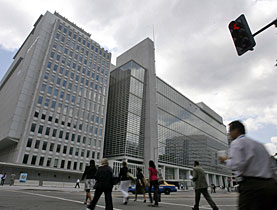Swiss shareholders “get raw deal”

Swiss firms are relatively unhindered by red tape in international comparison but minority shareholders get a raw deal, according to a World Bank survey.
Switzerland dropped one place to 16th in the Doing Business 2008 report, which compares the time and cost of setting up, running and closing a small and medium-sized enterprise (SME) in 178 countries.
The Swiss regulatory system scores high marks in most fields, but Switzerland is one of the worst countries in the world at protecting the rights of minority shareholders. Only 20 countries in the sample are worse at ensuring such stakeholders get access to information.
But this is not a big issue for Swiss firms, according to Professor Thierry Volery from St Gallen University’s SME institute. In fact, he says it helps managers operate more efficiently as they do not have to spend as much time keeping shareholders informed of every decision.
Of greater concern are the high fees associated with paperwork, particularly when trading across national borders. Myriad local regulations, which vary from canton to canton, also present a headache.
“Different cantons have different health and safety rules and they even have different ways of measuring the height of a building,” Volery told swissinfo. “This hinders the internal market.”
Volery believes both problems could be solved at a stroke if Switzerland adopted the European Union Cassis de Dijon principle – a rule that harmonises the trade of goods.
“A lot of problematic Swiss regulations would be obsolete overnight. For example, a toothpaste manufacturer could make a standard product for the whole European market rather than having to make a special Swiss version because a particular ingredient is not on the list,” he said.
Michael Klein of the World Bank agreed that even the higher-ranked countries, such as Switzerland, could not afford to rest on their laurels.
“Some countries think that reforming regulation is like climbing a mountain: when they get to the top they can stop and enjoy the view. But reform is a constantly continuing process,” he said at the presentation of the Doing Business 2008 report in Zurich on Monday.
Transparency
Local regulations present a greater headache in countries with less transparency than Switzerland. In some Central American countries, Klein said, local governments change rules with each successive regime without adequately informing firms.
The Swiss Secretariat for Economic Affairs (Seco) is currently working to improve the regulatory systems in 20 developing countries. It says its efforts have already transformed the business inspection system in Tajikistan from an “extortion regime” into a bribe-free zone.
But Seco’s Thierry Buchs acknowledged that such reforms could just as easily be dismantled as put into place. However, he insisted that increased transparency is having a positive effect in many countries.
“Getting our reforms into local newspapers is a very important part of the process. All of a sudden people can compare their regime with the neighbouring district and this has implications among the electorate during elections,” he said.
swissinfo, Matthew Allen in Zurich
According to the World Bank’s Doing Business 2008 report, Singapore once again has the best business regulatory system for domestic SMEs to flourish.
It is followed by New Zealand, the United States, Hong Kong and Denmark.
Other key economies are: Britain (6), Japan (12), Germany (20), France (31), Italy (53), China (83) and India (120).
The Democratic Republic of Congo props up the list in last place (178).
Egypt, Croatia, Ghana and Macedonia are currently the most active reformers in the field of domestic business regulation.
Eritrea (34) and Ethiopia (33) have the most number of statutory annual leave days for workers.

In compliance with the JTI standards
More: SWI swissinfo.ch certified by the Journalism Trust Initiative

You can find an overview of ongoing debates with our journalists here . Please join us!
If you want to start a conversation about a topic raised in this article or want to report factual errors, email us at english@swissinfo.ch.